Unit 10 I’d like some noodles 期末知识归纳+综合能力提升(含答案)
文档属性
| 名称 | Unit 10 I’d like some noodles 期末知识归纳+综合能力提升(含答案) | 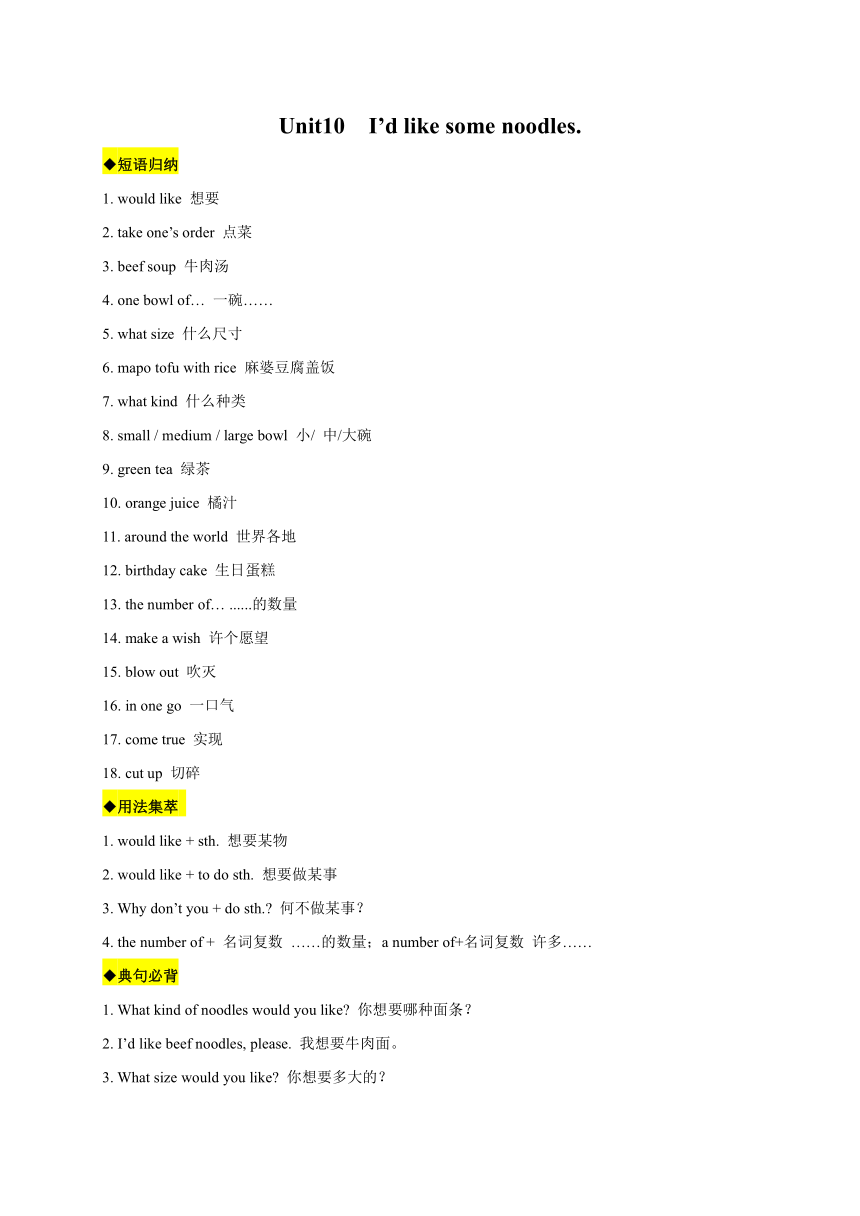 | |
| 格式 | zip | ||
| 文件大小 | 21.0KB | ||
| 资源类型 | 教案 | ||
| 版本资源 | 人教新目标(Go for it)版 | ||
| 科目 | 英语 | ||
| 更新时间 | 2020-06-15 20:29:33 | ||
图片预览

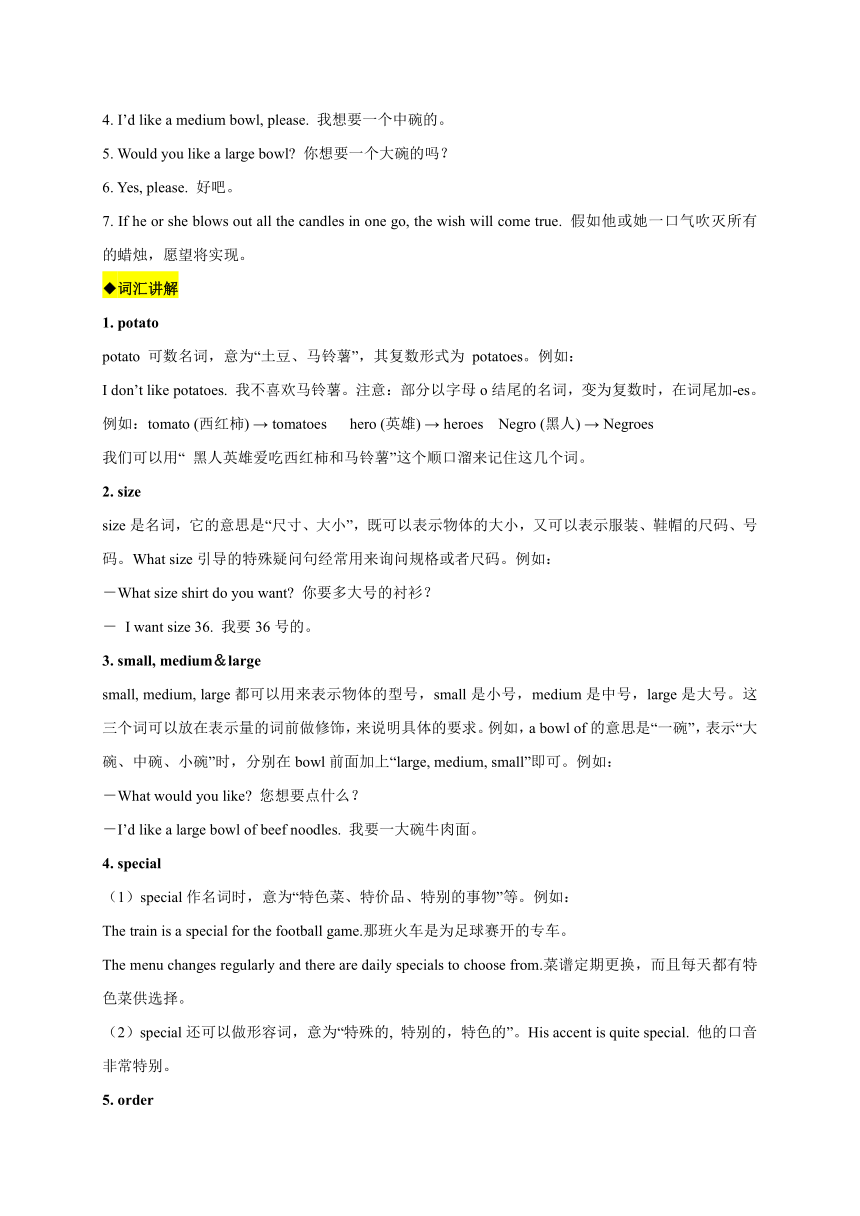
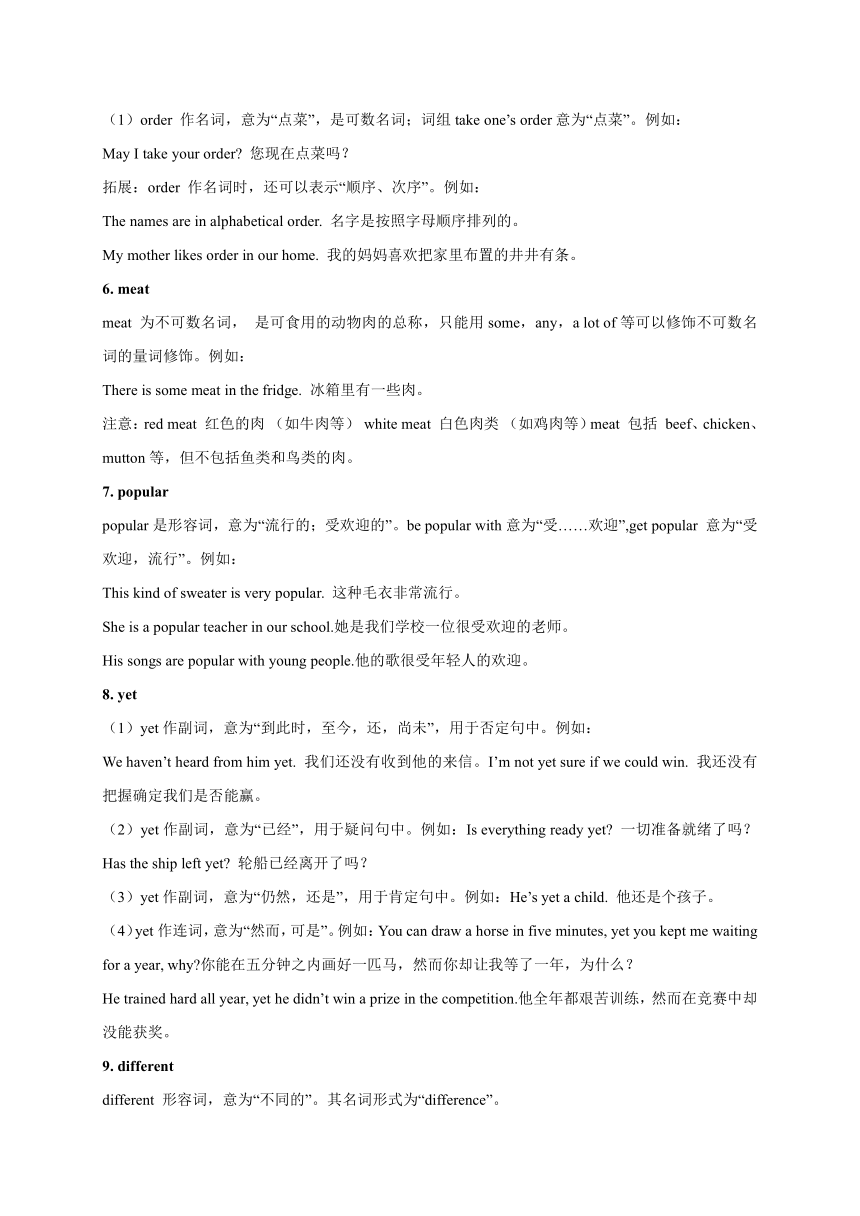
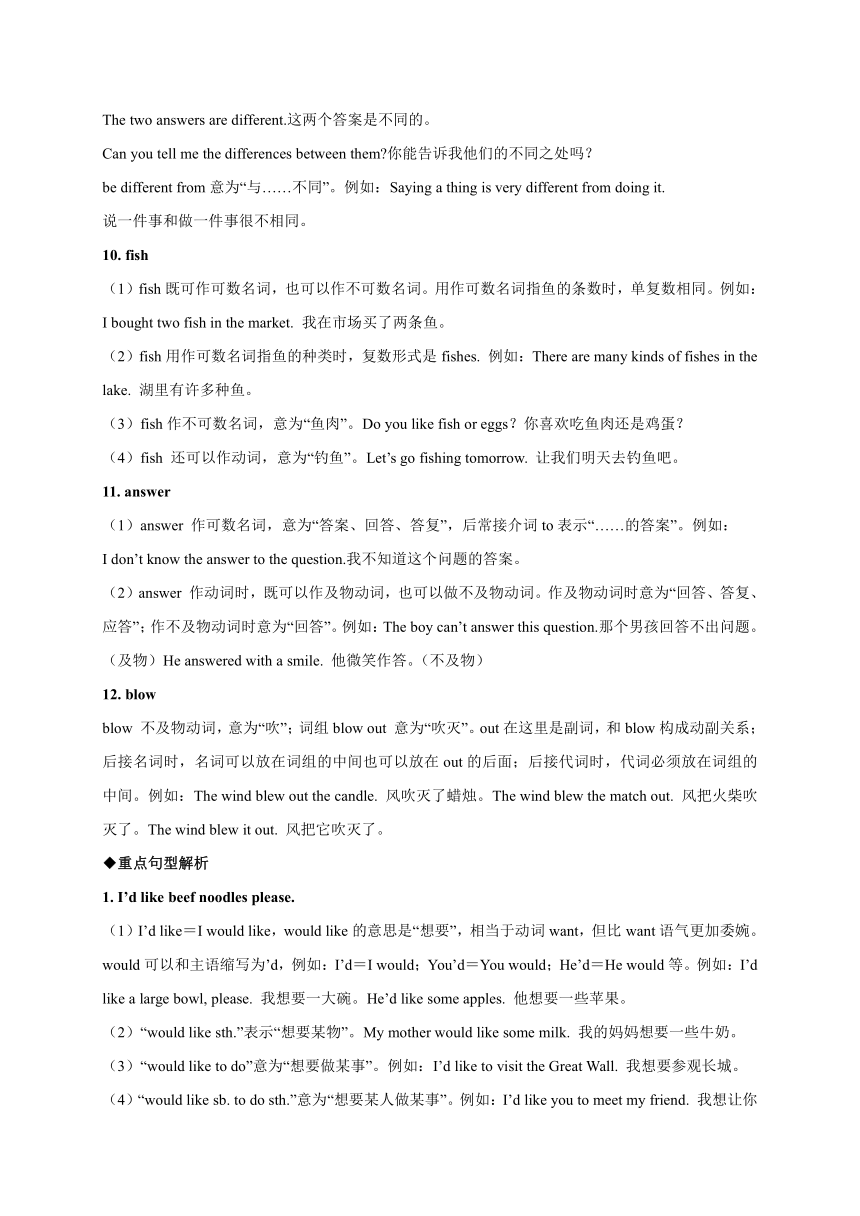
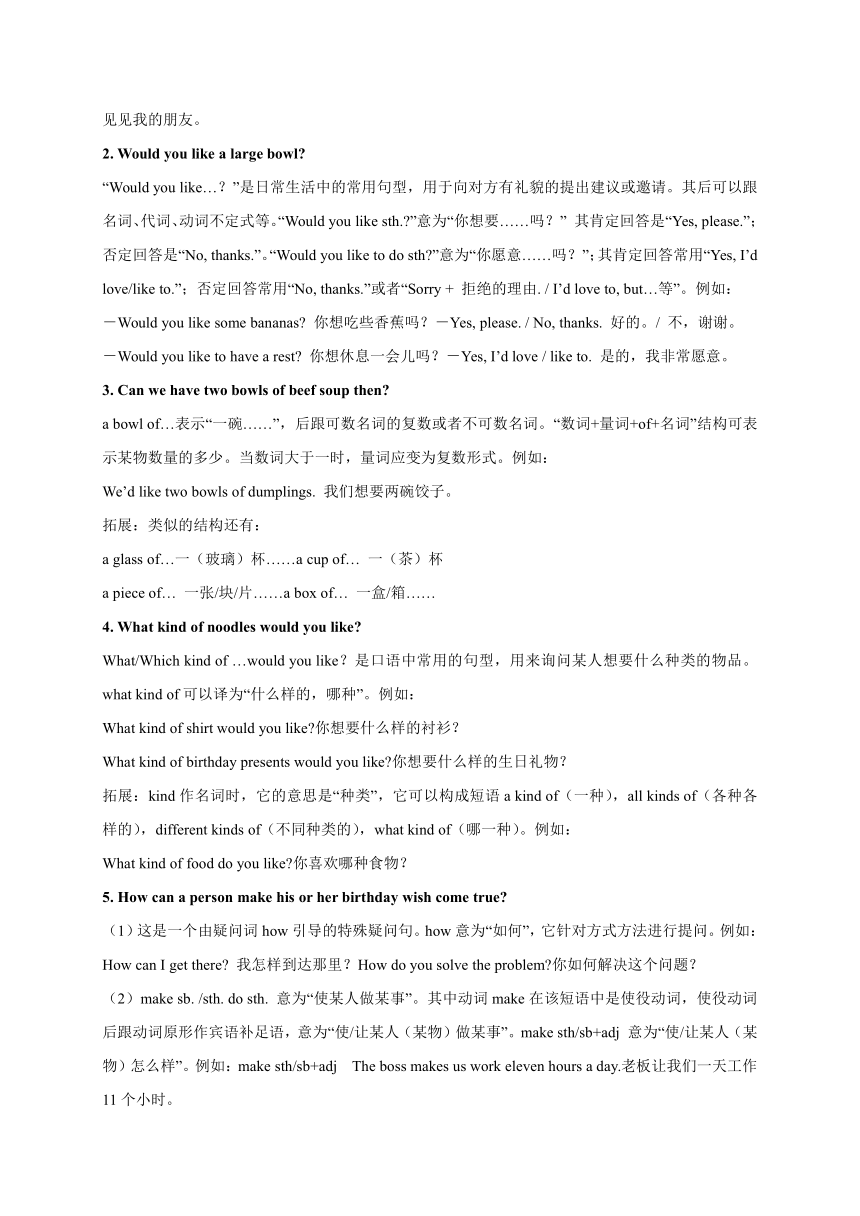
文档简介
Unit10
I’d
like
some
noodles.
◆短语归纳
1.
would
like
想要
2.
take
one’s
order
点菜
3.
beef
soup
牛肉汤
4.
one
bowl
of…
一碗……
5.
what
size
什么尺寸
6.
mapo
tofu
with
rice
麻婆豆腐盖饭
7.
what
kind
什么种类
8.
small
/
medium
/
large
bowl
小/
中/大碗
9.
green
tea
绿茶
10.
orange
juice
橘汁
11.
around
the
world
世界各地
12.
birthday
cake
生日蛋糕
13.
the
number
of…
......的数量
14.
make
a
wish
许个愿望
15.
blow
out
吹灭
16.
in
one
go
一口气
17.
come
true
实现
18.
cut
up
切碎
◆用法集萃
1.
would
like
+
sth.
想要某物
2.
would
like
+
to
do
sth.
想要做某事
3.
Why
don’t
you
+
do
sth.?
何不做某事?
4.
the
number
of
+
名词复数
……的数量;a
number
of+名词复数
许多……
◆典句必背
1.
What
kind
of
noodles
would
you
like?
你想要哪种面条?
2.
I’d
like
beef
noodles,
please.
我想要牛肉面。
3.
What
size
would
you
like?
你想要多大的?
4.
I’d
like
a
medium
bowl,
please.
我想要一个中碗的。
5.
Would
you
like
a
large
bowl?
你想要一个大碗的吗?
6.
Yes,
please.
好吧。
7.
If
he
or
she
blows
out
all
the
candles
in
one
go,
the
wish
will
come
true.
假如他或她一口气吹灭所有的蜡烛,愿望将实现。
◆词汇讲解
1.
potato
potato
可数名词,意为“土豆、马铃薯”,其复数形式为
potatoes。例如:
I
don’t
like
potatoes.
我不喜欢马铃薯。注意:部分以字母o结尾的名词,变为复数时,在词尾加-es。例如:tomato
(西红柿)
→
tomatoes
hero
(英雄)
→
heroes
Negro
(黑人)
→
Negroes
我们可以用“
黑人英雄爱吃西红柿和马铃薯”这个顺口溜来记住这几个词。
2.
size
size是名词,它的意思是“尺寸、大小”,既可以表示物体的大小,又可以表示服装、鞋帽的尺码、号码。What
size引导的特殊疑问句经常用来询问规格或者尺码。例如:
-What
size
shirt
do
you
want?
你要多大号的衬衫?
-
I
want
size
36.
我要36号的。
3.
small,
medium&large
small,
medium,
large都可以用来表示物体的型号,small是小号,medium是中号,large是大号。这三个词可以放在表示量的词前做修饰,来说明具体的要求。例如,a
bowl
of的意思是“一碗”,表示“大碗、中碗、小碗”时,分别在bowl前面加上“large,
medium,
small”即可。例如:
-What
would
you
like?
您想要点什么?
-I’d
like
a
large
bowl
of
beef
noodles.
我要一大碗牛肉面。
4.
special
(1)special作名词时,意为“特色菜、特价品、特别的事物”等。例如:
The
train
is
a
special
for
the
football
game.那班火车是为足球赛开的专车。
The
menu
changes
regularly
and
there
are
daily
specials
to
choose
from.菜谱定期更换,而且每天都有特色菜供选择。
(2)special还可以做形容词,意为“特殊的,
特别的,特色的”。His
accent
is
quite
special.
他的口音非常特别。
5.
order
(1)order
作名词,意为“点菜”,是可数名词;词组take
one’s
order意为“点菜”。例如:
May
I
take
your
order?
您现在点菜吗?
拓展:order
作名词时,还可以表示“顺序、次序”。例如:
The
names
are
in
alphabetical
order.
名字是按照字母顺序排列的。
My
mother
likes
order
in
our
home.
我的妈妈喜欢把家里布置的井井有条。
6.
meat
meat
为不可数名词,
是可食用的动物肉的总称,只能用some,any,a
lot
of等可以修饰不可数名词的量词修饰。例如:
There
is
some
meat
in
the
fridge.
冰箱里有一些肉。
注意:red
meat
红色的肉
(如牛肉等)
white
meat
白色肉类
(如鸡肉等)meat
包括
beef、chicken、mutton等,但不包括鱼类和鸟类的肉。
7.
popular
popular是形容词,意为“流行的;受欢迎的”。be
popular
with意为“受……欢迎”,get
popular
意为“受欢迎,流行”。例如:
This
kind
of
sweater
is
very
popular.
这种毛衣非常流行。
She
is
a
popular
teacher
in
our
school.她是我们学校一位很受欢迎的老师。
His
songs
are
popular
with
young
people.他的歌很受年轻人的欢迎。
8.
yet
(1)yet作副词,意为“到此时,至今,还,尚未”,用于否定句中。例如:
We
haven’t
heard
from
him
yet.
我们还没有收到他的来信。I’m
not
yet
sure
if
we
could
win.
我还没有把握确定我们是否能赢。
(2)yet作副词,意为“已经”,用于疑问句中。例如:Is
everything
ready
yet?
一切准备就绪了吗?Has
the
ship
left
yet?
轮船已经离开了吗?
(3)yet作副词,意为“仍然,还是”,用于肯定句中。例如:He’s
yet
a
child.
他还是个孩子。
(4)yet作连词,意为“然而,可是”。例如:You
can
draw
a
horse
in
five
minutes,
yet
you
kept
me
waiting
for
a
year,
why?你能在五分钟之内画好一匹马,然而你却让我等了一年,为什么?
He
trained
hard
all
year,
yet
he
didn’t
win
a
prize
in
the
competition.他全年都艰苦训练,然而在竞赛中却没能获奖。
9.
different
different
形容词,意为“不同的”。其名词形式为“difference”。
The
two
answers
are
different.这两个答案是不同的。
Can
you
tell
me
the
differences
between
them?你能告诉我他们的不同之处吗?
be
different
from意为“与……不同”。例如:Saying
a
thing
is
very
different
from
doing
it.
说一件事和做一件事很不相同。
10.
fish
(1)fish既可作可数名词,也可以作不可数名词。用作可数名词指鱼的条数时,单复数相同。例如:
I
bought
two
fish
in
the
market.
我在市场买了两条鱼。
(2)fish用作可数名词指鱼的种类时,复数形式是fishes.
例如:There
are
many
kinds
of
fishes
in
the
lake.
湖里有许多种鱼。
(3)fish作不可数名词,意为“鱼肉”。Do
you
like
fish
or
eggs?你喜欢吃鱼肉还是鸡蛋?
(4)fish
还可以作动词,意为“钓鱼”。Let’s
go
fishing
tomorrow.
让我们明天去钓鱼吧。
11.
answer
(1)answer
作可数名词,意为“答案、回答、答复”,后常接介词to表示“……的答案”。例如:
I
don’t
know
the
answer
to
the
question.我不知道这个问题的答案。
(2)answer
作动词时,既可以作及物动词,也可以做不及物动词。作及物动词时意为“回答、答复、应答”;作不及物动词时意为“回答”。例如:The
boy
can’t
answer
this
question.那个男孩回答不出问题。(及物)He
answered
with
a
smile.
他微笑作答。(不及物)
12.
blow
blow
不及物动词,意为“吹”;词组blow
out
意为“吹灭”。out在这里是副词,和blow构成动副关系;后接名词时,名词可以放在词组的中间也可以放在out的后面;后接代词时,代词必须放在词组的中间。例如:The
wind
blew
out
the
candle.
风吹灭了蜡烛。The
wind
blew
the
match
out.
风把火柴吹灭了。The
wind
blew
it
out.
风把它吹灭了。
◆重点句型解析
1.
I’d
like
beef
noodles
please.
(1)I’d
like=I
would
like,would
like的意思是“想要”,相当于动词want,但比want语气更加委婉。would可以和主语缩写为’d,例如:I’d=I
would;You’d=You
would;He’d=He
would等。例如:I’d
like
a
large
bowl,
please.
我想要一大碗。He’d
like
some
apples.
他想要一些苹果。
(2)“would
like
sth.”表示“想要某物”。My
mother
would
like
some
milk.
我的妈妈想要一些牛奶。
(3)“would
like
to
do”意为“想要做某事”。例如:I’d
like
to
visit
the
Great
Wall.
我想要参观长城。
(4)“would
like
sb.
to
do
sth.”意为“想要某人做某事”。例如:I’d
like
you
to
meet
my
friend.
我想让你见见我的朋友。
2.
Would
you
like
a
large
bowl?
“Would
you
like…?”是日常生活中的常用句型,用于向对方有礼貌的提出建议或邀请。其后可以跟名词、代词、动词不定式等。“Would
you
like
sth.?”意为“你想要……吗?”
其肯定回答是“Yes,
please.”;否定回答是“No,
thanks.”。“Would
you
like
to
do
sth?”意为“你愿意……吗?”;其肯定回答常用“Yes,
I’d
love/like
to.”;否定回答常用“No,
thanks.”或者“Sorry
+
拒绝的理由.
/
I’d
love
to,
but…等”。例如:
-Would
you
like
some
bananas?
你想吃些香蕉吗?-Yes,
please.
/
No,
thanks.
好的。/
不,谢谢。
-Would
you
like
to
have
a
rest?
你想休息一会儿吗?-Yes,
I’d
love
/
like
to.
是的,我非常愿意。
3.
Can
we
have
two
bowls
of
beef
soup
then?
a
bowl
of…表示“一碗……”,后跟可数名词的复数或者不可数名词。“数词+量词+of+名词”结构可表示某物数量的多少。当数词大于一时,量词应变为复数形式。例如:
We’d
like
two
bowls
of
dumplings.
我们想要两碗饺子。
拓展:类似的结构还有:
a
glass
of…一(玻璃)杯……a
cup
of…
一(茶)杯
a
piece
of…
一张/块/片……a
box
of…
一盒/箱……
4.
What
kind
of
noodles
would
you
like?
What/Which
kind
of
…would
you
like?是口语中常用的句型,用来询问某人想要什么种类的物品。what
kind
of可以译为“什么样的,哪种”。例如:
What
kind
of
shirt
would
you
like?你想要什么样的衬衫?
What
kind
of
birthday
presents
would
you
like?你想要什么样的生日礼物?
拓展:kind作名词时,它的意思是“种类”,它可以构成短语a
kind
of(一种),all
kinds
of(各种各样的),different
kinds
of(不同种类的),what
kind
of(哪一种)。例如:
What
kind
of
food
do
you
like?你喜欢哪种食物?
5.
How
can
a
person
make
his
or
her
birthday
wish
come
true?
(1)这是一个由疑问词how引导的特殊疑问句。how意为“如何”,它针对方式方法进行提问。例如:How
can
I
get
there?
我怎样到达那里?How
do
you
solve
the
problem?你如何解决这个问题?
(2)make
sb.
/sth.
do
sth.
意为“使某人做某事”。其中动词make在该短语中是使役动词,使役动词后跟动词原形作宾语补足语,意为“使/让某人(某物)做某事”。make
sth/sb+adj
意为“使/让某人(某物)怎么样”。例如:make
sth/sb+adj
The
boss
makes
us
work
eleven
hours
a
day.老板让我们一天工作11个小时。
综合能力提升
I.用括号中所给单词的适当形式填空。
1.
Most
man
don’t
like
go
______
(shop).
2.
The
wind_______
(blow)
hard
now.
3.
I’d
like
_______
(order)
a
large
bowl
of
beef
noodles.
4.
The
Pizza
House
has
some
great
_______
(special).
5.
They
would
like
_______
(potato)
noodles.
6.
There
are
shoes
of
all
_______
(size)
in
the
supermarket.
7.
Everyone
_______
(love)
oranges.
They
are
sweet
and
juicy.
8.
I
don’t
like
eating
_______
(orange),
but
I
like
to
drink
_______
(orange).
9.
She’d
like
some
________
(tomato),
she
doesn’t
like
_______
(strawberry).
10.
We
have
some
_______
(fish)
for
lunch.
II.选词填空。
1.
Would
you
like
_______
(some
/
any)
ice
cream?
2.
Is
there
______
(some
/
any)
meat
in
the
bowl?
3.
--What
______
(kind
/
size)
bowl
of
rice
would
you
like?--Small
size.
4.
There
is
_______
(not
/
no)
water
in
the
bottle.
5.
Welcome
to
the
________
restaurant!
We
have
different
_______
(noodles/
noodle).
III.句型转换,每空一词。
1.
My
pencil
isn’t
the
same
as
yours.
(改为同义句)
My
pencil
is
_______
_______
yours.
2.
His
age
is
17.
(改为同义句)
He
is
17
_______
_______.
3.
People
would
like
to
eat
long
noodles
on
their
birthday.
(就划线部分提问)
______
_______
people
______
_______
eat
on
their
birthday?
4.
I’d
like
to
go
to
the
movies.
(就划线部分提问)
______
______
you
like
_______
_______?
5.
I’d
like
some
tomatoes.
(改为一般疑问句)
______
you
like
______
tomatoes?
6.
She’d
like
a
medium
bag
of
apples.
(就划线部分提问)
_______
_______
bag
of
apples
would
she
like?
7.
They’d
like
a
medium
bowl
of
noodles.
(改为同义句)
They______
a
medium
bowl
of
noodles.
8.
-Would
you
like
beef
noodles?
(做肯定回答)
-Yes,
______.
9.
-Would
you
like
mutton
and
potato
noodles?
(作否定回答)
-No,
______.
10.
I’d
like
beef
and
potato
noodles.
(对划线部分提问)
______
______
you
like?
IV.根据汉语意思,完成句子,每空一词。
1.
让我们打电话订一份大碗的面条吧。
Let’s
make
a
phone
to
order
_____
_____
_____
_____
_____.
2.
请递给我一些土豆和牛肉。
Please
pass
me
____
____
and
____.
3.
我能喝一碗牛肉汤吗?
Can
I
have
_______
_______
______
beef
soup?
4.
-你穿多大码的鞋子?-我穿18码的。
-What
______
shoes
______
you
wear?
-I
wear
______
18.
5.
他们想要什么种类的面条?
What
_______
_______
noodles
_______
they
like?
6.
在过生日的时候人们吃什么?
______
would
people
like
to
eat
______
their
birthday?
7.
长面条是长寿的象征。
The
long
_____
are
a
symbol
of
____
_____.
8.
白冰的爸爸想要她在2013年去美国留学。
Baibing’s
father
_____
____
her
____
go
to
America
for
studying
in
2013.
9.
在我们班女生的人数是27人。
_______
______
_______
the
girls
in
our
class
is
twenty-seven.
10.
这个消息让我们开心。
The
news
_______
us
______.
V.单项填空
1.
Would
you
like
______
chicken
_______
breakfast?
A.
one;to
B.
some;of
C.
some;for
D.
a;for
2.
We
have
four
________
salad
in
our
shop.
A.
size
B.
kinds
of
C.
kind
of
D.
kinds
3.
—________
rice
would
you
like?
—Large,
please.
A.
What
kind
of
B.
What
size
bowl
of
C.
What
size
of
D.
What
4.
We
have
bought
two________
for
the
coming
party.
A.
box
of
apple
B.
boxes
of
apples
C.
box
of
apples
D.
boxes
of
apple
5.
There
is
little_______
in
the
fridge.
Let’s
go
and
buy
some.
A.
apples
B.
eggs
C.
vegetables
D.
milk
6.
What
would
you
like
________
the
pizza?
A.
in
B.
on
C.
at
D.
during
7.
The
number
of
the
boys
in
our
class
_________
35.
A.
are
B.
be
C.
am
D.
is
8.
I
don’t
like
soda
,hot
dogs
_________
onions.
A.
and
B.
or
C.
but
D.
so
9.
He’d
like
a
hamburger
_______
chicken.
A.
in
B.
on
C.
for
D.
with
10.—Would
you
like
a
small
hamburger?
—
__________
.
No,
I
would
like
B.
No,
I
wouldn’t
C.
No,
thanks
D.
No,I
don’t
VI.完形填空
It’s
half
past
four
in
the
afternoon.
1
is
ready.
There
are
many
things
2
the
table—plates,
bowls
and
glasses.
We
can
see
some
meat,
eggs
and
fish
3
the
plates.
There
are
some
dumplings,
noodles
and
rice.
Oh,
there
is
a
big
round
cake
in
the
middle
of
the
4
.There
is
5
to
drink,
five
glasses
there.
6
of
the
glasses
is
full
of
milk,
two
of
them
are
full
of
coffee
and
the
others
7
full
of
Coke.
There
are
two
bottles
of
apple
juice.
That’s
great.
They
8
our
favourite
food
and
drinks.
I’d
like
9
them
very
much.
Why
are
there
so
many
nice
10
?
Today
is
Bill’s
grandma’s
birthday.
1.A.Breakfast
B.
Lunch
C.
Supper
D.
Meals
2.A.in
B.
on
C.
under
D.
at
3.A.on
B.
in
C.
at
D.
to
4.A.plates
B.
table
C.
bowl
D.
bottle
5.A.anything
B.
things
C.
something
D.
nothing
6.A.Some
B.
One
C.
Two
D.
Three
7.A.are
B.
is
C.
have
D./
8.A.all
are
B.
are
all
C.
are
both
D.
both
are
9.A.have
B.
to
have
C.
has
D.
having
10.A.things
B.
thing
C.
something
D.
anything
VII.阅读理解
A
The
Noodle
House
has
really
good
noodles.
They
are
cheap,
and
they
are
great!
You
can
get
small,
medium,
or
large
bowls
of
noodles.
The
Noodle
House
has
some
specials.
Special
1
has
beef
and
tomato
and
is
only
¥5.Special
2
has
mutton
and
cabbage.
It
is
¥6.And
Special
3
has
chicken
and
carrot.
It’s
only
¥8.I
like
it
best.
You
can
get
some
other
great
food
at
the
Noodle
House.
For
example,
you
can
get
16
dumplings
for
¥11.You
can
get
great
desserts!
You
can
get
strawberry,
banana
and
orange
ice
cream.
They
are
all
nice!
Try
the
Noodle
House
soon!
根据短文内容判断正(T)误(F)。
1.
The
noodles
here
are
cheap
and
great.
2.
There
are
three
size
bowls
of
noodles.
3.
Special
2
has
beef
and
tomato
and
is
only
¥5.
4.
You
can
get
16
dumplings
for
¥11.
5.
You
can
get
chocolate
ice
cream
at
Noodle
House.
B
It’s
Sunday
today.
My
parents
and
I
go
to
a
small
restaurant
for
supper.The
waiter
passes
us
the
menu.
MENU
Name
Mixture(配料)
Price
Special
Ⅰ
onions,
mushrooms,
cheese
$3.75
Special
Ⅱ
pepperoni,
tomatoes,
olives,
cheese
$3.5
Special
Ⅲ
mushrooms,
eggs,
onions
$3.6
Hamburger
chicken
leg
$2.8
Lemonade
$2
iced
tea
$2
iced
cola
$2
My
father
orders
Special
Ⅰ
and
a
glass
of
lemonade
.My
mother
orders
the
same
pizza
as
my
father,
but
she’d
like
to
drink
iced
tea.
I
order
Special
Ⅲ
and
a
hamburger.
What’s
more
(另外),I
ask
the
waiter
to
give
me
a
glass
of
iced
cola.
根据短文内容填空。
6.According
to(根据)the
MENU,
if
you
don’t
like
cheese
on
your
pizza,
you
can
choose(选择)Special________.
7.If
you’d
like
pepperoni
on
your
pizza,
you
can
choose
Special_________
.
8.My
mother
would
like
Special
______
and
a
cup
of_______.
9.My
dinner
costs
__________
.
10.Our
dinner
costs
in
all
___________(总计).
VIII.书面表达(满分15分)
根据下面的提示词,描述一下你的家人一日三餐的饮食情况。词数60左右。
参考词汇:eggs,
porridge,
beef,
rice,
noodles,
fish,
onion,
cabbage,
dumplings
________________________________________________________________________________________________________________________________________________________________________________________________________________________________________________________________________________________________________________________________________________________
参考答案
I.用括号中所给单词的适当形式填空。
1.
shopping
2.
is
blowing
3.
to
order
4.
specials
5.
potato
6.
sizes
7.
loves
8.
oranges,
orange
9.
tomatoes,
strawberries
10.
fish
II.选词填空。
1.
some
2.
any
3.
size
4.
no
5.
noodle,
noodles
III.句型转换,每空一词。
1.
different
from
2.
years
old
3.
What
would,
like
to
4.
What
would,
to
do
5.
Would,
some
6.
What
size
7.
want
8.
please
9.
thanks
10.
What
would
IV.
根据汉语意思,完成句子,每空一词。
1.
a
large
bowl
of
noodles
2.
some
potatoes,
beef
3.
a
bowl
of
4.
size,
do,
size
5.
kind
of,
would
6.
What,
on
7.
noodles,
long
life
8.
would
like,
to
9.
The
number
of
10.
makes,
happy
V.
单项填空
1.C
句意:早饭你要吃些鸡肉吗?chicken“鸡肉”为不可数名词,不能用a,one来修饰。“对于”早饭来说应用介词for,不用of。
2.B
根据句意“在我们店里有四种沙拉”可知。
3.B
根据答语可知要大份的米饭,所以问句应为“要多大碗的米饭?”,故B项正确。
4.B
box及apple都是可数名词。“两盒苹果”表示为two
boxes
of
apples。
5.D
little修饰不可数名词。
6.B
“在……上”用介词on。
7.D
“the
number
of+复数名词”意为“……的数量”,作主语,谓语动词用单数形式。
8.B
or用于否定句中,连接并列的成分。
9.D
with表示“有,带有”。
10.C
Would
you
like...?的否定回答为“No,thanks.”。
VI.
完形填空
1.C
根据短文第一句所交代的时间知“晚餐准备好了”。D项可以代替晚餐,但不应用复数形式。
2.B
on
the
table在桌子上。由句中主语判断,其他介词表示的位置不符合逻辑。
3.A
表示“在”盘子里应用介词on而不用in。
4.B
从句子内容分析,大的圆形蛋糕不可能放在“盘子/碗/瓶子”中间,应该放在“桌子”中间。
5.C
有喝的东西,anything用在否定句中,things前的动词应用复数形式,又因下文已提到饮料,故选C项。
6.B
由连系动词is决定选择one。
7.A
the
others代替上文的glasses(玻璃杯),are与其在数上保持一致。
8.B
根据本文所介绍的一系列食品和饮料知,应选B项。C项语序正确,但both指两者。
9.B
would
like
to
do
sth.意为“想要做某事”。
10.A
so
many修饰可数名词的复数形式。故选A项。
VII.
阅读理解
1.T
根据短文第一段的第二句话可知。
2.T
根据短文第二段可知,有大碗、中碗、小碗三种。
3.F
根据短文可知,Special
1的特色如此,故本句不符合短文信息。
4.T
根据短文第四段的第二句话可知。
5.F
根据短文第四段的最后一句话可知,没有巧克力冰淇淋。
6.Ⅲ
根据MENU表格中的信息可知。
7.Ⅱ
根据MENU表格中的信息可知。
8.Ⅰ;iced
tea
根据MENU表格下面的信息可知。
9.$8.4
Special
Ⅲ花费$3.6,a
hamburger花费$2.8,a
glass
of
iced
cola花费$2,三种食物共计$8.4。
10.$19.9
我父母亲和我总计花费:3.75+2+3.75+2+8.4=19.9。
VIII.
书面表达
One
possible
version:
There
are
three
people
in
my
family.
They
are
my
father,my
mother
and
I.
My
father
and
my
mother
like
eggs
and
porridge
for
breakfast
but
I
like
noodles.
My
father
eats
dumplings
for
lunch.
My
mother
and
I
have
beef
and
rice
for
lunch.
For
dinner,
my
father
and
my
mother
like
to
eat
the
dish
of
cabbage,
fish,
the
dishes
of
onion
and
noodles,but
I
like
onion
dumplings.
I’d
like
some
noodles.
◆短语归纳
1.
would
like
想要
2.
take
one’s
order
点菜
3.
beef
soup
牛肉汤
4.
one
bowl
of…
一碗……
5.
what
size
什么尺寸
6.
mapo
tofu
with
rice
麻婆豆腐盖饭
7.
what
kind
什么种类
8.
small
/
medium
/
large
bowl
小/
中/大碗
9.
green
tea
绿茶
10.
orange
juice
橘汁
11.
around
the
world
世界各地
12.
birthday
cake
生日蛋糕
13.
the
number
of…
......的数量
14.
make
a
wish
许个愿望
15.
blow
out
吹灭
16.
in
one
go
一口气
17.
come
true
实现
18.
cut
up
切碎
◆用法集萃
1.
would
like
+
sth.
想要某物
2.
would
like
+
to
do
sth.
想要做某事
3.
Why
don’t
you
+
do
sth.?
何不做某事?
4.
the
number
of
+
名词复数
……的数量;a
number
of+名词复数
许多……
◆典句必背
1.
What
kind
of
noodles
would
you
like?
你想要哪种面条?
2.
I’d
like
beef
noodles,
please.
我想要牛肉面。
3.
What
size
would
you
like?
你想要多大的?
4.
I’d
like
a
medium
bowl,
please.
我想要一个中碗的。
5.
Would
you
like
a
large
bowl?
你想要一个大碗的吗?
6.
Yes,
please.
好吧。
7.
If
he
or
she
blows
out
all
the
candles
in
one
go,
the
wish
will
come
true.
假如他或她一口气吹灭所有的蜡烛,愿望将实现。
◆词汇讲解
1.
potato
potato
可数名词,意为“土豆、马铃薯”,其复数形式为
potatoes。例如:
I
don’t
like
potatoes.
我不喜欢马铃薯。注意:部分以字母o结尾的名词,变为复数时,在词尾加-es。例如:tomato
(西红柿)
→
tomatoes
hero
(英雄)
→
heroes
Negro
(黑人)
→
Negroes
我们可以用“
黑人英雄爱吃西红柿和马铃薯”这个顺口溜来记住这几个词。
2.
size
size是名词,它的意思是“尺寸、大小”,既可以表示物体的大小,又可以表示服装、鞋帽的尺码、号码。What
size引导的特殊疑问句经常用来询问规格或者尺码。例如:
-What
size
shirt
do
you
want?
你要多大号的衬衫?
-
I
want
size
36.
我要36号的。
3.
small,
medium&large
small,
medium,
large都可以用来表示物体的型号,small是小号,medium是中号,large是大号。这三个词可以放在表示量的词前做修饰,来说明具体的要求。例如,a
bowl
of的意思是“一碗”,表示“大碗、中碗、小碗”时,分别在bowl前面加上“large,
medium,
small”即可。例如:
-What
would
you
like?
您想要点什么?
-I’d
like
a
large
bowl
of
beef
noodles.
我要一大碗牛肉面。
4.
special
(1)special作名词时,意为“特色菜、特价品、特别的事物”等。例如:
The
train
is
a
special
for
the
football
game.那班火车是为足球赛开的专车。
The
menu
changes
regularly
and
there
are
daily
specials
to
choose
from.菜谱定期更换,而且每天都有特色菜供选择。
(2)special还可以做形容词,意为“特殊的,
特别的,特色的”。His
accent
is
quite
special.
他的口音非常特别。
5.
order
(1)order
作名词,意为“点菜”,是可数名词;词组take
one’s
order意为“点菜”。例如:
May
I
take
your
order?
您现在点菜吗?
拓展:order
作名词时,还可以表示“顺序、次序”。例如:
The
names
are
in
alphabetical
order.
名字是按照字母顺序排列的。
My
mother
likes
order
in
our
home.
我的妈妈喜欢把家里布置的井井有条。
6.
meat
meat
为不可数名词,
是可食用的动物肉的总称,只能用some,any,a
lot
of等可以修饰不可数名词的量词修饰。例如:
There
is
some
meat
in
the
fridge.
冰箱里有一些肉。
注意:red
meat
红色的肉
(如牛肉等)
white
meat
白色肉类
(如鸡肉等)meat
包括
beef、chicken、mutton等,但不包括鱼类和鸟类的肉。
7.
popular
popular是形容词,意为“流行的;受欢迎的”。be
popular
with意为“受……欢迎”,get
popular
意为“受欢迎,流行”。例如:
This
kind
of
sweater
is
very
popular.
这种毛衣非常流行。
She
is
a
popular
teacher
in
our
school.她是我们学校一位很受欢迎的老师。
His
songs
are
popular
with
young
people.他的歌很受年轻人的欢迎。
8.
yet
(1)yet作副词,意为“到此时,至今,还,尚未”,用于否定句中。例如:
We
haven’t
heard
from
him
yet.
我们还没有收到他的来信。I’m
not
yet
sure
if
we
could
win.
我还没有把握确定我们是否能赢。
(2)yet作副词,意为“已经”,用于疑问句中。例如:Is
everything
ready
yet?
一切准备就绪了吗?Has
the
ship
left
yet?
轮船已经离开了吗?
(3)yet作副词,意为“仍然,还是”,用于肯定句中。例如:He’s
yet
a
child.
他还是个孩子。
(4)yet作连词,意为“然而,可是”。例如:You
can
draw
a
horse
in
five
minutes,
yet
you
kept
me
waiting
for
a
year,
why?你能在五分钟之内画好一匹马,然而你却让我等了一年,为什么?
He
trained
hard
all
year,
yet
he
didn’t
win
a
prize
in
the
competition.他全年都艰苦训练,然而在竞赛中却没能获奖。
9.
different
different
形容词,意为“不同的”。其名词形式为“difference”。
The
two
answers
are
different.这两个答案是不同的。
Can
you
tell
me
the
differences
between
them?你能告诉我他们的不同之处吗?
be
different
from意为“与……不同”。例如:Saying
a
thing
is
very
different
from
doing
it.
说一件事和做一件事很不相同。
10.
fish
(1)fish既可作可数名词,也可以作不可数名词。用作可数名词指鱼的条数时,单复数相同。例如:
I
bought
two
fish
in
the
market.
我在市场买了两条鱼。
(2)fish用作可数名词指鱼的种类时,复数形式是fishes.
例如:There
are
many
kinds
of
fishes
in
the
lake.
湖里有许多种鱼。
(3)fish作不可数名词,意为“鱼肉”。Do
you
like
fish
or
eggs?你喜欢吃鱼肉还是鸡蛋?
(4)fish
还可以作动词,意为“钓鱼”。Let’s
go
fishing
tomorrow.
让我们明天去钓鱼吧。
11.
answer
(1)answer
作可数名词,意为“答案、回答、答复”,后常接介词to表示“……的答案”。例如:
I
don’t
know
the
answer
to
the
question.我不知道这个问题的答案。
(2)answer
作动词时,既可以作及物动词,也可以做不及物动词。作及物动词时意为“回答、答复、应答”;作不及物动词时意为“回答”。例如:The
boy
can’t
answer
this
question.那个男孩回答不出问题。(及物)He
answered
with
a
smile.
他微笑作答。(不及物)
12.
blow
blow
不及物动词,意为“吹”;词组blow
out
意为“吹灭”。out在这里是副词,和blow构成动副关系;后接名词时,名词可以放在词组的中间也可以放在out的后面;后接代词时,代词必须放在词组的中间。例如:The
wind
blew
out
the
candle.
风吹灭了蜡烛。The
wind
blew
the
match
out.
风把火柴吹灭了。The
wind
blew
it
out.
风把它吹灭了。
◆重点句型解析
1.
I’d
like
beef
noodles
please.
(1)I’d
like=I
would
like,would
like的意思是“想要”,相当于动词want,但比want语气更加委婉。would可以和主语缩写为’d,例如:I’d=I
would;You’d=You
would;He’d=He
would等。例如:I’d
like
a
large
bowl,
please.
我想要一大碗。He’d
like
some
apples.
他想要一些苹果。
(2)“would
like
sth.”表示“想要某物”。My
mother
would
like
some
milk.
我的妈妈想要一些牛奶。
(3)“would
like
to
do”意为“想要做某事”。例如:I’d
like
to
visit
the
Great
Wall.
我想要参观长城。
(4)“would
like
sb.
to
do
sth.”意为“想要某人做某事”。例如:I’d
like
you
to
meet
my
friend.
我想让你见见我的朋友。
2.
Would
you
like
a
large
bowl?
“Would
you
like…?”是日常生活中的常用句型,用于向对方有礼貌的提出建议或邀请。其后可以跟名词、代词、动词不定式等。“Would
you
like
sth.?”意为“你想要……吗?”
其肯定回答是“Yes,
please.”;否定回答是“No,
thanks.”。“Would
you
like
to
do
sth?”意为“你愿意……吗?”;其肯定回答常用“Yes,
I’d
love/like
to.”;否定回答常用“No,
thanks.”或者“Sorry
+
拒绝的理由.
/
I’d
love
to,
but…等”。例如:
-Would
you
like
some
bananas?
你想吃些香蕉吗?-Yes,
please.
/
No,
thanks.
好的。/
不,谢谢。
-Would
you
like
to
have
a
rest?
你想休息一会儿吗?-Yes,
I’d
love
/
like
to.
是的,我非常愿意。
3.
Can
we
have
two
bowls
of
beef
soup
then?
a
bowl
of…表示“一碗……”,后跟可数名词的复数或者不可数名词。“数词+量词+of+名词”结构可表示某物数量的多少。当数词大于一时,量词应变为复数形式。例如:
We’d
like
two
bowls
of
dumplings.
我们想要两碗饺子。
拓展:类似的结构还有:
a
glass
of…一(玻璃)杯……a
cup
of…
一(茶)杯
a
piece
of…
一张/块/片……a
box
of…
一盒/箱……
4.
What
kind
of
noodles
would
you
like?
What/Which
kind
of
…would
you
like?是口语中常用的句型,用来询问某人想要什么种类的物品。what
kind
of可以译为“什么样的,哪种”。例如:
What
kind
of
shirt
would
you
like?你想要什么样的衬衫?
What
kind
of
birthday
presents
would
you
like?你想要什么样的生日礼物?
拓展:kind作名词时,它的意思是“种类”,它可以构成短语a
kind
of(一种),all
kinds
of(各种各样的),different
kinds
of(不同种类的),what
kind
of(哪一种)。例如:
What
kind
of
food
do
you
like?你喜欢哪种食物?
5.
How
can
a
person
make
his
or
her
birthday
wish
come
true?
(1)这是一个由疑问词how引导的特殊疑问句。how意为“如何”,它针对方式方法进行提问。例如:How
can
I
get
there?
我怎样到达那里?How
do
you
solve
the
problem?你如何解决这个问题?
(2)make
sb.
/sth.
do
sth.
意为“使某人做某事”。其中动词make在该短语中是使役动词,使役动词后跟动词原形作宾语补足语,意为“使/让某人(某物)做某事”。make
sth/sb+adj
意为“使/让某人(某物)怎么样”。例如:make
sth/sb+adj
The
boss
makes
us
work
eleven
hours
a
day.老板让我们一天工作11个小时。
综合能力提升
I.用括号中所给单词的适当形式填空。
1.
Most
man
don’t
like
go
______
(shop).
2.
The
wind_______
(blow)
hard
now.
3.
I’d
like
_______
(order)
a
large
bowl
of
beef
noodles.
4.
The
Pizza
House
has
some
great
_______
(special).
5.
They
would
like
_______
(potato)
noodles.
6.
There
are
shoes
of
all
_______
(size)
in
the
supermarket.
7.
Everyone
_______
(love)
oranges.
They
are
sweet
and
juicy.
8.
I
don’t
like
eating
_______
(orange),
but
I
like
to
drink
_______
(orange).
9.
She’d
like
some
________
(tomato),
she
doesn’t
like
_______
(strawberry).
10.
We
have
some
_______
(fish)
for
lunch.
II.选词填空。
1.
Would
you
like
_______
(some
/
any)
ice
cream?
2.
Is
there
______
(some
/
any)
meat
in
the
bowl?
3.
--What
______
(kind
/
size)
bowl
of
rice
would
you
like?--Small
size.
4.
There
is
_______
(not
/
no)
water
in
the
bottle.
5.
Welcome
to
the
________
restaurant!
We
have
different
_______
(noodles/
noodle).
III.句型转换,每空一词。
1.
My
pencil
isn’t
the
same
as
yours.
(改为同义句)
My
pencil
is
_______
_______
yours.
2.
His
age
is
17.
(改为同义句)
He
is
17
_______
_______.
3.
People
would
like
to
eat
long
noodles
on
their
birthday.
(就划线部分提问)
______
_______
people
______
_______
eat
on
their
birthday?
4.
I’d
like
to
go
to
the
movies.
(就划线部分提问)
______
______
you
like
_______
_______?
5.
I’d
like
some
tomatoes.
(改为一般疑问句)
______
you
like
______
tomatoes?
6.
She’d
like
a
medium
bag
of
apples.
(就划线部分提问)
_______
_______
bag
of
apples
would
she
like?
7.
They’d
like
a
medium
bowl
of
noodles.
(改为同义句)
They______
a
medium
bowl
of
noodles.
8.
-Would
you
like
beef
noodles?
(做肯定回答)
-Yes,
______.
9.
-Would
you
like
mutton
and
potato
noodles?
(作否定回答)
-No,
______.
10.
I’d
like
beef
and
potato
noodles.
(对划线部分提问)
______
______
you
like?
IV.根据汉语意思,完成句子,每空一词。
1.
让我们打电话订一份大碗的面条吧。
Let’s
make
a
phone
to
order
_____
_____
_____
_____
_____.
2.
请递给我一些土豆和牛肉。
Please
pass
me
____
____
and
____.
3.
我能喝一碗牛肉汤吗?
Can
I
have
_______
_______
______
beef
soup?
4.
-你穿多大码的鞋子?-我穿18码的。
-What
______
shoes
______
you
wear?
-I
wear
______
18.
5.
他们想要什么种类的面条?
What
_______
_______
noodles
_______
they
like?
6.
在过生日的时候人们吃什么?
______
would
people
like
to
eat
______
their
birthday?
7.
长面条是长寿的象征。
The
long
_____
are
a
symbol
of
____
_____.
8.
白冰的爸爸想要她在2013年去美国留学。
Baibing’s
father
_____
____
her
____
go
to
America
for
studying
in
2013.
9.
在我们班女生的人数是27人。
_______
______
_______
the
girls
in
our
class
is
twenty-seven.
10.
这个消息让我们开心。
The
news
_______
us
______.
V.单项填空
1.
Would
you
like
______
chicken
_______
breakfast?
A.
one;to
B.
some;of
C.
some;for
D.
a;for
2.
We
have
four
________
salad
in
our
shop.
A.
size
B.
kinds
of
C.
kind
of
D.
kinds
3.
—________
rice
would
you
like?
—Large,
please.
A.
What
kind
of
B.
What
size
bowl
of
C.
What
size
of
D.
What
4.
We
have
bought
two________
for
the
coming
party.
A.
box
of
apple
B.
boxes
of
apples
C.
box
of
apples
D.
boxes
of
apple
5.
There
is
little_______
in
the
fridge.
Let’s
go
and
buy
some.
A.
apples
B.
eggs
C.
vegetables
D.
milk
6.
What
would
you
like
________
the
pizza?
A.
in
B.
on
C.
at
D.
during
7.
The
number
of
the
boys
in
our
class
_________
35.
A.
are
B.
be
C.
am
D.
is
8.
I
don’t
like
soda
,hot
dogs
_________
onions.
A.
and
B.
or
C.
but
D.
so
9.
He’d
like
a
hamburger
_______
chicken.
A.
in
B.
on
C.
for
D.
with
10.—Would
you
like
a
small
hamburger?
—
__________
.
No,
I
would
like
B.
No,
I
wouldn’t
C.
No,
thanks
D.
No,I
don’t
VI.完形填空
It’s
half
past
four
in
the
afternoon.
1
is
ready.
There
are
many
things
2
the
table—plates,
bowls
and
glasses.
We
can
see
some
meat,
eggs
and
fish
3
the
plates.
There
are
some
dumplings,
noodles
and
rice.
Oh,
there
is
a
big
round
cake
in
the
middle
of
the
4
.There
is
5
to
drink,
five
glasses
there.
6
of
the
glasses
is
full
of
milk,
two
of
them
are
full
of
coffee
and
the
others
7
full
of
Coke.
There
are
two
bottles
of
apple
juice.
That’s
great.
They
8
our
favourite
food
and
drinks.
I’d
like
9
them
very
much.
Why
are
there
so
many
nice
10
?
Today
is
Bill’s
grandma’s
birthday.
1.A.Breakfast
B.
Lunch
C.
Supper
D.
Meals
2.A.in
B.
on
C.
under
D.
at
3.A.on
B.
in
C.
at
D.
to
4.A.plates
B.
table
C.
bowl
D.
bottle
5.A.anything
B.
things
C.
something
D.
nothing
6.A.Some
B.
One
C.
Two
D.
Three
7.A.are
B.
is
C.
have
D./
8.A.all
are
B.
are
all
C.
are
both
D.
both
are
9.A.have
B.
to
have
C.
has
D.
having
10.A.things
B.
thing
C.
something
D.
anything
VII.阅读理解
A
The
Noodle
House
has
really
good
noodles.
They
are
cheap,
and
they
are
great!
You
can
get
small,
medium,
or
large
bowls
of
noodles.
The
Noodle
House
has
some
specials.
Special
1
has
beef
and
tomato
and
is
only
¥5.Special
2
has
mutton
and
cabbage.
It
is
¥6.And
Special
3
has
chicken
and
carrot.
It’s
only
¥8.I
like
it
best.
You
can
get
some
other
great
food
at
the
Noodle
House.
For
example,
you
can
get
16
dumplings
for
¥11.You
can
get
great
desserts!
You
can
get
strawberry,
banana
and
orange
ice
cream.
They
are
all
nice!
Try
the
Noodle
House
soon!
根据短文内容判断正(T)误(F)。
1.
The
noodles
here
are
cheap
and
great.
2.
There
are
three
size
bowls
of
noodles.
3.
Special
2
has
beef
and
tomato
and
is
only
¥5.
4.
You
can
get
16
dumplings
for
¥11.
5.
You
can
get
chocolate
ice
cream
at
Noodle
House.
B
It’s
Sunday
today.
My
parents
and
I
go
to
a
small
restaurant
for
supper.The
waiter
passes
us
the
menu.
MENU
Name
Mixture(配料)
Price
Special
Ⅰ
onions,
mushrooms,
cheese
$3.75
Special
Ⅱ
pepperoni,
tomatoes,
olives,
cheese
$3.5
Special
Ⅲ
mushrooms,
eggs,
onions
$3.6
Hamburger
chicken
leg
$2.8
Lemonade
$2
iced
tea
$2
iced
cola
$2
My
father
orders
Special
Ⅰ
and
a
glass
of
lemonade
.My
mother
orders
the
same
pizza
as
my
father,
but
she’d
like
to
drink
iced
tea.
I
order
Special
Ⅲ
and
a
hamburger.
What’s
more
(另外),I
ask
the
waiter
to
give
me
a
glass
of
iced
cola.
根据短文内容填空。
6.According
to(根据)the
MENU,
if
you
don’t
like
cheese
on
your
pizza,
you
can
choose(选择)Special________.
7.If
you’d
like
pepperoni
on
your
pizza,
you
can
choose
Special_________
.
8.My
mother
would
like
Special
______
and
a
cup
of_______.
9.My
dinner
costs
__________
.
10.Our
dinner
costs
in
all
___________(总计).
VIII.书面表达(满分15分)
根据下面的提示词,描述一下你的家人一日三餐的饮食情况。词数60左右。
参考词汇:eggs,
porridge,
beef,
rice,
noodles,
fish,
onion,
cabbage,
dumplings
________________________________________________________________________________________________________________________________________________________________________________________________________________________________________________________________________________________________________________________________________________________
参考答案
I.用括号中所给单词的适当形式填空。
1.
shopping
2.
is
blowing
3.
to
order
4.
specials
5.
potato
6.
sizes
7.
loves
8.
oranges,
orange
9.
tomatoes,
strawberries
10.
fish
II.选词填空。
1.
some
2.
any
3.
size
4.
no
5.
noodle,
noodles
III.句型转换,每空一词。
1.
different
from
2.
years
old
3.
What
would,
like
to
4.
What
would,
to
do
5.
Would,
some
6.
What
size
7.
want
8.
please
9.
thanks
10.
What
would
IV.
根据汉语意思,完成句子,每空一词。
1.
a
large
bowl
of
noodles
2.
some
potatoes,
beef
3.
a
bowl
of
4.
size,
do,
size
5.
kind
of,
would
6.
What,
on
7.
noodles,
long
life
8.
would
like,
to
9.
The
number
of
10.
makes,
happy
V.
单项填空
1.C
句意:早饭你要吃些鸡肉吗?chicken“鸡肉”为不可数名词,不能用a,one来修饰。“对于”早饭来说应用介词for,不用of。
2.B
根据句意“在我们店里有四种沙拉”可知。
3.B
根据答语可知要大份的米饭,所以问句应为“要多大碗的米饭?”,故B项正确。
4.B
box及apple都是可数名词。“两盒苹果”表示为two
boxes
of
apples。
5.D
little修饰不可数名词。
6.B
“在……上”用介词on。
7.D
“the
number
of+复数名词”意为“……的数量”,作主语,谓语动词用单数形式。
8.B
or用于否定句中,连接并列的成分。
9.D
with表示“有,带有”。
10.C
Would
you
like...?的否定回答为“No,thanks.”。
VI.
完形填空
1.C
根据短文第一句所交代的时间知“晚餐准备好了”。D项可以代替晚餐,但不应用复数形式。
2.B
on
the
table在桌子上。由句中主语判断,其他介词表示的位置不符合逻辑。
3.A
表示“在”盘子里应用介词on而不用in。
4.B
从句子内容分析,大的圆形蛋糕不可能放在“盘子/碗/瓶子”中间,应该放在“桌子”中间。
5.C
有喝的东西,anything用在否定句中,things前的动词应用复数形式,又因下文已提到饮料,故选C项。
6.B
由连系动词is决定选择one。
7.A
the
others代替上文的glasses(玻璃杯),are与其在数上保持一致。
8.B
根据本文所介绍的一系列食品和饮料知,应选B项。C项语序正确,但both指两者。
9.B
would
like
to
do
sth.意为“想要做某事”。
10.A
so
many修饰可数名词的复数形式。故选A项。
VII.
阅读理解
1.T
根据短文第一段的第二句话可知。
2.T
根据短文第二段可知,有大碗、中碗、小碗三种。
3.F
根据短文可知,Special
1的特色如此,故本句不符合短文信息。
4.T
根据短文第四段的第二句话可知。
5.F
根据短文第四段的最后一句话可知,没有巧克力冰淇淋。
6.Ⅲ
根据MENU表格中的信息可知。
7.Ⅱ
根据MENU表格中的信息可知。
8.Ⅰ;iced
tea
根据MENU表格下面的信息可知。
9.$8.4
Special
Ⅲ花费$3.6,a
hamburger花费$2.8,a
glass
of
iced
cola花费$2,三种食物共计$8.4。
10.$19.9
我父母亲和我总计花费:3.75+2+3.75+2+8.4=19.9。
VIII.
书面表达
One
possible
version:
There
are
three
people
in
my
family.
They
are
my
father,my
mother
and
I.
My
father
and
my
mother
like
eggs
and
porridge
for
breakfast
but
I
like
noodles.
My
father
eats
dumplings
for
lunch.
My
mother
and
I
have
beef
and
rice
for
lunch.
For
dinner,
my
father
and
my
mother
like
to
eat
the
dish
of
cabbage,
fish,
the
dishes
of
onion
and
noodles,but
I
like
onion
dumplings.
同课章节目录
- Unit 1 Can you play the guitar?
- Section A
- Section B
- Unit 2 What time do you go to school?
- Section A
- Section B
- Unit 3 How do you get to school?
- Section A
- Section B
- Unit 4 Don't eat in class.
- Section A
- Section B
- Unit 5 Why do you like pandas?
- Section A
- Section B
- Unit 6 I'm watching TV.
- Section A
- Section B
- Review of Units 1-6
- Unit 7 It's raining!
- Section A
- Section B
- Unit 8 Is there a post office near here?
- Section A
- Section B
- Unit 9 What does he look like?
- Section A
- Section B
- Unit 10 I'd like some noodles.
- Section A
- Section B
- Unit 11 How was your school trip?
- Section A
- Section B
- Unit 12 What did you do last weekend?
- Section A
- Section B
